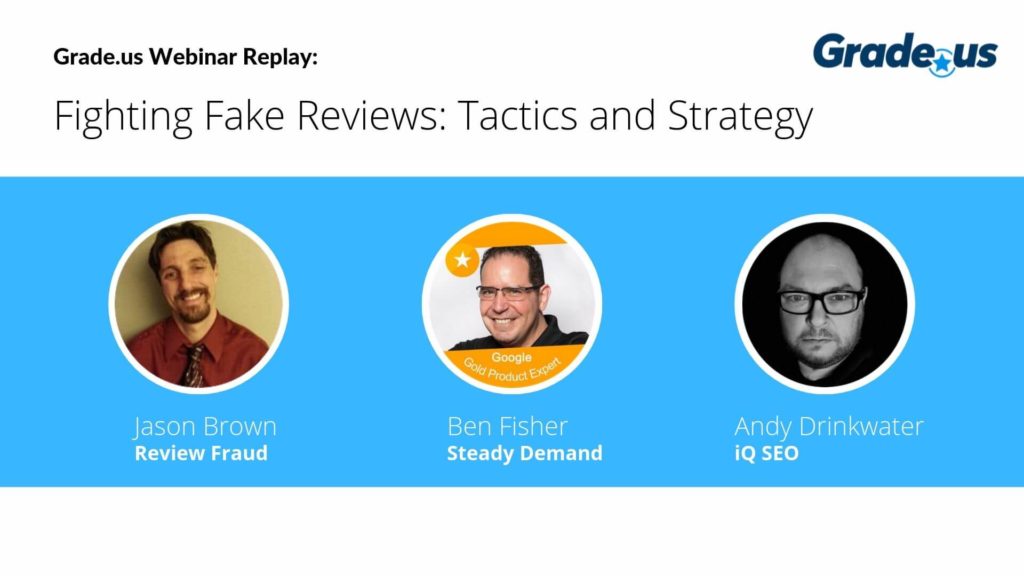Dealing with fake reviews, both positive (left for competitors), and negative (left for your business) is one of the most frustrating things about building a local presence. Unscrupulous companies use fraudulent reviews to gain a competitive edge they could never legitimately earn.
Good news: if you've been plagued by this problem there's a lot you can do to combat it.
In our recent webinar, Garrett Sussman sat down with three fake review experts to discuss tactics for handling fake reviews: Jason Brown of Reviewfraud.org, Ben Fisher of Steady Demand, and Andy Drinkwater of iQ SEO.
Don't have time to watch the whole thing? Here are the key takeaways from the discussion.
Why are Google Reviews important to local businesses in 2019?
By the numbers:
- 86% of consumers read local business reviews.
- According to the Local Rankings Study, 15% of Google’s local ranking factors come from review signals.
- 40% of consumers only consider reviews left in the last two weeks. If you’re only getting a couple of reviews each month, you’re probably missing out on quite a few opportunities.
- Consumers read at least 10 reviews before deciding they can trust you.
If you're not getting reviews, you aren't earning trust. In 2019, if you aren't earning trust you are losing business.
How big of a problem are fake reviews for business owners right now?
The modern review ecosystem is getting plagued with more fake reviews than ever, because it's getting easier and easier to set up fake review schemes.
For example, there are entire Facebook groups out there devoted solely to buying reviews, or groups where people set up review swaps.
Often, unscrupulous business owners are buying negative reviews for competitors instead of positive reviews for themselves. Buyers are getting better at spotting fake positive reviews, so it's easier to tank someone else's reputation than it is to use fake reviews to build your own.
Is Google getting any better at taking steps to prevent or handle fake reviews?
Google's working harder on cracking down on fake listings right now, instead of focusing on the review space. This means that sometimes Google doesn't always take down fake reviews even after those reviews have been submitted and flagged.
You might need to take some additional steps to get those reviews removed, and they're unlikely to handle any fake review problem you don't bring to their attention first.
What kinds of fake review schemes are out there?
There are the simple schemes, where people just solicit fake review writers in return for a couple of dollars per reviews. There are, however, more complex schemes out there.
The 4-star review scheme is one of the biggest ones happening at the moment. People leave what looks like a positive, 4-star review. This seems harmless on its surface, but steadily pulls down the rating of 5-star businesses. A downward shift of even a single percentile can have a huge impact and can cost businesses a great deal of money.
Sometimes this puts their closest competitor on top. Sometimes, this behavior can knock a local business right out of the Local 3-Pack. Business owners should be monitoring 4-star reviews very closely.
How do you spot fake reviews?
Spotting fake reviews takes some detective work. You'll need to look for patterns.
- For example, if you start digging into a listing’s reviews you might notice a lot of the reviewers have left just three reviews: one for the location and two for two fake locations somewhere else. Or they might leave one for the location and two for just random local restaurants in the area.
- You should also look for a large number of reviews pouring in all at once, then tapering off. This can be a sign that someone is running a review promotion that’s in violation of the review platform’s T&C. You’ll want to track down the promotion details to include as evidence when you bring the matter to Google’s attention.
- A spike in reviews can also be motivated by responses to news stories, and may come from people who have never stepped foot into your establishment but who are reacting to those stories in some way.
- Look for the way language is used. A lot of fake reviews come from overseas, from places like the Philippines, or Russia. They tend to make the same mistakes on each of their fakes. Of course, even native English speakers make mistakes, such as one business owner who left himself fake positive reviews in all caps, then answered each review in all caps.
- Do a reverse image searches if you suspect a fake profile. Sometimes you’ll find out the picture came from a mugshot, or a photo of a model or a celebrity. Go see what else they’ve reviewed. If they’ve reviewed 18 locations for the same business in multiple locations and not much else, you’re probably looking at a fake profile.
The signs are all there to be found, you just have to look for them.
How should you respond to fake reviews?
Avoid getting angry. You can't get anywhere by arguing with a fake profile.
Do respond. You should respond to all reviews, both positive and negative. If you only respond to positive reviews you'll look like someone who only cares when someone says something nice about you. If you only respond to negative reviews it looks like you only respond when you feel the need to defend yourself.
If you respond to all reviews, you'll be in a much better position to beat fakes at their own game. You can do things like asking them to bring you the invoice for a full refund, or providing a [email protected] email address where they can send in a phone number so you can contact them.
You can also politely point out inaccuracies, i.e., "Thank you for your valuable input. We don't sell macaroons here, so I'm not sure if we're the business you visited."
Silence is also a response, so failing to respond never works out very well. 89% of customers do read review responses, and they do base decisions off of how professional and polite the responses appear to be.
Or as Ben Fisher puts it:
"Think like a pirate, and say A.A.R.R.G.!"
- Accept
- Acknowledge
- Reply
- Resolve
- Grade.us
You have to accept what they say, acknowledge it, and offer a resolution in your reply. Then consider building a review strategy with a platform like Grade.us so you can insulate your business with a more robust profile of legitimate reviews.
You may reach a point where you've got too many fake reviews to handle on your own, or when you've tried to get somewhere with review removal on your own but just can't. That's where you need to hire an expert who can help you.
How do experts get fake Google reviews removed from client GMB listings?
There are two ways, and they're both ways a business owner can try if they aren't ready to hire an expert yet.
First, you can reach out to Google My Business Support on Twitter. Make sure you follow their account so they can DM you a reply.
If that doesn't work, head on over to the GMB help community. Post your case and your evidence so that one of the experts can help you bring the matter to Google's attention.
Don't try to phone Google or email them. Even the experts find these methods to be highly ineffective.
From there, it's a matter of presenting your evidence in the right way. Create a spreadsheet to help you organize and catalogue the reviews. This can help you spot patterns and quickly point them out to others. Include links and screenshots. If there was a specific time frame during which fake reviews all started pouring in, make notes about the time and try to find a link to the event or source that prompted that response.
How can you get fake Facebook recommendations removed?
If you can identify that the fake review came from a fake profile you can get farther by flagging the profile than you can by flagging the review itself.
In general, our guest experts agree you shouldn't worry too much about Facebook's role in the review ecosystem. It doesn't have a good reputation with consumers and its shift to "recommendations" has made it even less of a threat.
One good thing about the recommendation shift is that people who really love your product and service will continue to use Facebook to serve as brand ambassadors to their own family members and friends. You can't control that, but you can focus on delivering the best product and service you can.
Yelp has a policy that prevents businesses from asking for Yelp reviews. Is there a workaround?
Yelp has really cracked down on fake reviews, but fake reviewers themselves pointed the way to a workaround.
Often, fake reviewers will leave a fake photo as well as a review. Yelp would often remove the review but keep the photo.
It's been confirmed with Yelp representatives: you can ask customers to take a photo without violating Yelp's T&C.
This is a great idea anyway, as customer photos get more impressions and engagement than company-generated photos. And once they're there, leaving a photo, they will often leave a review as well.
Don't have a very photogenic business?
You can say something like, "Have you seen our Yelp reviews? Be sure to check them out." When people do, they will, again, often leave a review of their own.
What are the top resources that local businesses should bookmark to help them with fake review problems?
Explore these three:
1. Google Alerts. They're free! Put an alert on all your brand names and product names so you get an email every time someone mentions them. Without constant monitoring it can be difficult to know you've received a review.
2. The GMB Help Community. This place is so important because Google will not do the work for you. You need to be a detective and document as much as possible. Members of the community can help you spot, and correct, weaknesses in your "case."
3. Review Jason Brown's SEMrush article: How to Deal with a Negative Review Attack. Jason offers a step-by-step guide for dealing with a negative review attack, documenting exactly what he did to correct the problem after an attack took his client's 4.3 rating down to a 2.8 rating.
Final Bits of Advice
Each of our guest experts offered some salient bits of final advice before closing out the webinar.
From Andy Drinkwater:
"Don't take it lying down. Don't just leave it at that. You've always got some kind of recourse."
Follow Andy on Twitter at @iQSEO.
From Ben Fisher:
"Be a pirate. Be Batman. Make sure to do your investigation."
Follow Ben on Twitter at @thesocialdude.
From Jason Brown:
"Be persistent. If you flag a review and don't see any action on it, contact support on Twitter or go to the forum. If that doesn't work, don't hesitate to go viral. Google responds to PR. Call your local press, and the media. They can exert some very effective pressure."
Follow Jason on Twitter at @keyserholiday.
About the Author
Raney C. Hudson
Raney C. Hudson is an independent content consultant with a 10+ year track record in the digital marketing industry.










